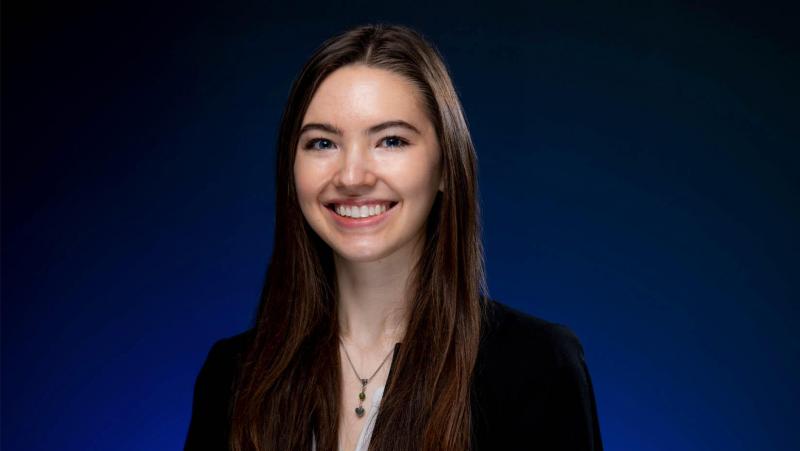UMaine valedictorian Bailey West embarking on a journey to make a difference through research
ORONO — University of Maine valedictorian Bailey West is impassioned by scientific research. She has been, in fact, since her days as a student at Searsport District High School.
West has been involved in research since high school, first with scientists at the Jackson Laboratory, MDI Biological Laboratory and Maine Medical Center, and then at UMaine with professor Dr. Julie Gosse.
At UMaine, West’s primary research, serving as her honors thesis project, has been in the toxicology lab under the instruction of Dr. Gosse studying an antibacterial chemical known as cetylpyridinium chloride (CPC) which is used extensively in personal-care products. Her honors thesis is titled, “Oral-care antimicrobial cetylpyridinium chloride inhibits mast cell function: role of tyrosine phosphorylation cascade.”
“Despite this widespread use, there is minimal known information about how CPC impacts human health,” said West. “We are specifically testing the effects of CPC on immune cell function. This research will be important going forward in making more informed risk-vs-benefit decisions regarding the use of CPC in consumer products and for other pharmaceutical uses.”
This summer, West will participate in The Jackson Lab’s Summer Student Program, a 10-week research fellowship in mammalian genetics and genomics.
After, in the fall, West will pursue a doctorate degree in pathobiology at the Johns Hopkins School of Medicine. The program is housed in the clinical pathology department of the School of Medicine and entails translational rotations that help place the research in the big-picture clinical context.
“With passions for both human health and scientific investigation, I aim for a career that lies at the intersection of these two interests, and the pathobiology graduate program is exactly that,” she said.
With her degrees, West envisions a professorship career at an academic institution that combines her loves of research and mentoring students intrigued, like she has been, by research.
“In my future career, my mission is to contribute to the improvement of human health through translational research and to directly mentor students as a principal investigator and professor at an academic institution,” said West. “Specifically, I aim to investigate the molecular mechanisms of human disease, so that advancements can ultimately be made in patient care and treatment.”
How exactly does one become enamored with research, as much as West has, as an undergraduate student?
“I have always had an interest in health and wellness and practiced Taekwondo for several years,” explained West. “Once I took biology in high school, I became increasingly interested in the cellular and molecular underpinnings of health and disease and became intrigued by career opportunities in medicine and biomedical research.”
The drive to find answers to science’s mysteries is a personal quest for West.
“Losing my grandfather to Alzheimer’s disease in high school made me realize firsthand that modern medicine cannot yet answer many of the questions patients and families have about their conditions,” she said. “I knew I wanted to engage in research as an undergraduate, and the biochemistry program at the University of Maine has abundant opportunities in this area, so this led me to my program of study. My passion for human health motivated me to initially pursue a medical career when I entered college.”
While a sophomore at UMaine, West was accepted to the Tufts University School of Medicine Early Assurance Program.
“After much reflection and engaging deeply in a research project with UMaine toxicologist Dr. Julie Gosse, I ultimately decided to instead pursue a research career,” said West. “All of my experiences, including Taekwondo, research fellowships, clinical experiences, study abroad, and tutoring, have shaped me and informed my career decision.”
The most rewarding aspect of research, thus far, for West has been collaborating with a team to make novel discoveries pertinent to human health.
The most rewarding aspect of research thus far has been collaborating with a team to make novel discoveries that are pertinent to human health.
“It is very fulfilling to feel that I am a part of a team whose research can make a real impact,” she said.
The most challenging aspect of research, she identified, is the process to reach the moments of discovery.
“Research is typically a long process with many unsuccessful attempts and no clear answer, which can be challenging to navigate,” West explained. “These failed attempts, however, are what ultimately lead to the successes, and it is important to not let myself get too discouraged by these temporary setbacks.”
The prospect of making a difference on society through research motivates West to keep researching, searching for the elusive answers and navigating the unsuccessful attempts.
“My biggest motivating factor is being able to positively impact people, whether through mentoring other students or through clinically relevant research,” she said. “Research is fun and exciting because of the curiosity and constant learning it entails, but the greatest motivation is knowing that my current and future work can hopefully make a difference to someone.”
In addition to her valedictorian honors, West is the Outstanding Graduating Student in the College of Natural Sciences, Forestry, and Agriculture, and the Outstanding Graduating Student in the Honors College. The honors student and Maine Top Scholar is the recipient of the Society of Toxicology Undergraduate Research Award and the George J. Mitchell Peace Scholarship. In spring 2020, West studied abroad at University College Cork in Ireland.
On campus, she has been a peer tutor and teaching assistant, and a student ambassador for the Honors College and the Study Abroad Program.
Event Date
Address
United States


























